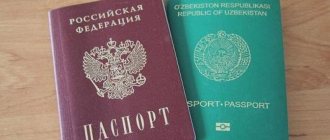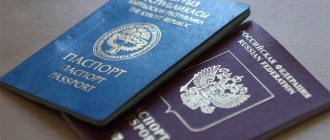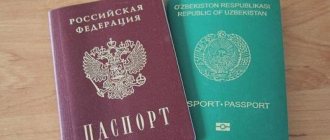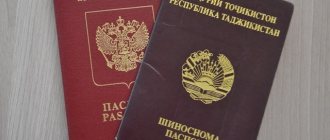In the Russian Federation, dual citizenship is not prohibited. There are no restrictions regarding the number of citizenships. A Russian can simultaneously be a citizen of several countries. But Russia provides for liability for late notification of dual citizenship. In this article we will examine the concept of dual citizenship.
The legislative framework
Important! Please keep in mind that:
- Each case is unique and individual.
- A thorough study of the issue does not always guarantee a positive outcome. It depends on many factors.
To get the most detailed advice on your issue, you just need to choose any of the options offered:
- Use the online chat in the lower corner of the screen.
- Call: Federal number: +7 (800) 511-86-74
Legislative regulation of this concept is carried out by the law “On Citizenship in the Russian Federation” and the corresponding article of the Constitution. These documents allow that a citizen of the Russian Federation may have the main document of another state, but in this case the main document will be citizenship of the Russian Federation.
The meaning of the phrase “dual citizenship” is the right of one person to possess the citizenship of two or more states, regardless of his permanent place of residence. On Russian territory, dual citizenship status is legalized only with two countries: Tajikistan and Turkmenistan.
Thus, according to Russian laws, a citizen can have a passport of a foreign state, but the legal status of “dual citizenship” exists only for the two above-mentioned countries.
According to the interstate agreement between the Russian Federation, Tajikistan and Turkmenistan, citizens of these countries are given the opportunity to acquire the citizenship of the other party - a party to the agreement, while maintaining their own.
In particular, according to the above agreement, “dual” citizens have all the rights, social guarantees and obligations of the state where they permanently reside.
On May 18, 2015, the agreement between the Russian Federation and Turkmenistan terminated. All citizens who received dual citizenship before this date retain it.
Important! The current law on citizenship of the Russian Federation (Article 6) provides for the right of a citizen to retain Russian citizenship when he acquires additional citizenship of a foreign state.
Legislative norms
The rules apply to Russian citizens living in the Russian Federation and staying abroad. In the first case, they are given 60 days; in the second, they must report changes within 30 days after arriving in the Russian Federation.
The current legislation does not prohibit obtaining a second citizenship, but a mutual agreement on its recognition has been signed only with Tajikistan and Turkmenistan. According to it, it is allowed to simultaneously have passports of two countries and choose any of them for permanent residence.
The law, adopted in 2014, states that dual citizenship is legal only if a treaty is concluded between states. The Constitution provides that citizens of the Russian Federation can have a passport of another state without losing the status of a Russian citizen. A prerequisite is timely notification of the acquisition of a second citizenship. Persons who have obtained a residence permit (permanent residence) or citizenship of several states notify about each of them with a separate application. For children under the age of majority, this must be done by parents (guardians). Russians can contact the Ministry of Internal Affairs structures located at:
- your stay;
- accommodation;
- actual residence.
How to submit a notification?
In 2014, the basic law on citizenship of the Russian Federation was adjusted. According to the new changes, a Russian citizen who has received a passport of another state, a residence permit or other legal basis for legal stay in the territory of another country is obliged to report this circumstance to the Ministry of Internal Affairs at the place of his actual residence. The notification period is 60 days from the date of receipt of the main document or residence permit.
Important! If a Russian citizen permanently resides in the territory of a foreign state, he will have to present a notification of obtaining additional citizenship only when returning to Russia. Deadline for submitting notification: no later than 30 days from the date of crossing the Russian border when entering the territory of the Russian Federation.
Every capable citizen who has reached the age of majority is required to notify the Ministry of Internal Affairs of the fact of obtaining dual citizenship. For minors and incapacitated persons, the obligation to submit an application shifts to their legal representatives.
Required documents
A valid sample application form for dual citizenship can be downloaded from the official website of the Federal Migration Service of the Russian Federation. It comes in two versions. The first is intended for legally capable persons over 18 years of age. The second is for other categories of citizens.
The following is attached to the application:
- Russian passport;
- a foreign passport or document giving legal residence in another country;
- resolution on assigning the status of “citizen of a foreign state”;
When submitting an application for an incapacitated citizen or a child under 18 years of age, the documents of the legal representative are additionally attached to it, as well as:
- child's birth certificate;
- confirmation from the guardianship authorities;
- power of attorney for a representative, certified by a notary.
Submitting a notice
To avoid imposition of a fine for failure to notify of second citizenship, you must personally submit an application and documents to the migration authorities of the Ministry of Internal Affairs at the place of actual location or registration.
Employees check the documents provided, the compliance of originals and copies. You are allowed to scan documents and send them by email or to a post office. Persons located in another state are required to report the presence of dual citizenship within a specified period after crossing the border of the Russian Federation. In addition to the application, you will need:
- a document (passport) containing an indication of citizenship;
- resolution confirming status;
- notarized power of attorney, if interests are represented by another person;
- birth certificate for minors;
- document declaring incapacity for citizens under guardianship;
- copies of all documents.
The notification must contain information:
- full name, date and detailed information about the place of birth, current place of actual residence;
- series and number of your identity document;
- information about a document giving the right to reside in another country;
- date and basis for obtaining second citizenship, residence permit.
You are allowed to fill out the form with your own hand and using technical means. Information is entered in Russian; Latin letters are allowed in certain columns.
Acceptance of a document may be refused in the following cases:
- there are empty lines;
- filled with factual and grammatical errors;
- there are corrections, strikethroughs;
- abbreviations, abbreviations instead of full names.
After registration, the part of the notification completed by the employee of the Ministry of Internal Affairs is torn off and given to the applicant. It must be preserved, since this document confirms the fact of compliance with legal requirements.
Liability for failure to notify
The purpose of providing information about obtaining a passport from another country is not to bring liability, but to create a common information base. Responsibility is provided not for dual citizenship, but for concealment or late submission of notification.
The following types of liability may apply to violators for failure to notify of dual citizenship:
- Administrative . For evasion or for failure to comply with the procedure for filing an application, i.e. deadlines were not met, false or incomplete information was submitted.
- Criminal liability. If the fact of dual citizenship was deliberately hidden.
Administrative liability for violating the procedure for filing a notification provides for punishment in the form of a fine, which will range from 500 to 1000 rubles.
Administrative liability for evading filing an application includes:
- a fine of 200 thousand rubles. or the average annual income of the perpetrator;
- community service in the amount of 400 hours, if the perpetrator does not have a permanent place of work.
Criminal liability provides for punishment in the form of imprisonment for up to 3 years. The reason for hiding information may be:
- participation in elections;
- entry into public service or a position that prohibits having a second citizenship.
How to avoid criminal liability for concealing a second citizenship, passport or residence permit?

Without a doubt, our readers, who, one way or another, are following all the vicissitudes of the adoption of contradictory changes in Russian legislation related to the need to report a second citizenship or residence permit in another country, are already aware of all the details of the controversial changes in legislation initiated by a deputy who is not allowed to travel abroad. from the Liberal Democratic Party of Russia by Alexei Lugovoy on March 31 of this year.
So, on May 23, the State Duma, unfortunately, nevertheless adopted in the third and final reading a bill that obliges Russian citizens to henceforth report the presence of a second citizenship or residence permit in another country to the authorities of the Federal Migration Service (FMS). According to changes in legislation, citizens of the Russian Federation who have received citizenship (nationality) of a foreign state or a residence permit in a foreign state must notify the FMS in writing or in person within 60 days. For violation of these established rules for notifying the FMS, both administrative and criminal liability are established. Thus, for late submission of a notification or for providing information contained in a notification in a distorted or incomplete form, you will have to pay an administrative fine of 500 to 1000 rubles. While complete disregard of the notification requirement is subject to criminal punishment or forced labor. Let us quote the changes made by Duma deputies to the Criminal Code verbatim and in full:
“Article 3302. Failure to fulfill the obligation to submit a notification about whether a citizen of the Russian Federation has citizenship (nationality) of a foreign state or a residence permit or other valid document confirming the right to permanent residence in a foreign state
Failure by a person to fulfill the obligation established by the legislation of the Russian Federation to submit to the relevant territorial body of the federal executive body authorized to exercise control and supervision functions in the field of migration, notification of the presence of a citizen of the Russian Federation of citizenship (nationality) of a foreign state or a residence permit or other valid a document confirming the right to permanent residence in a foreign country –
shall be punishable by a fine in the amount of up to two hundred thousand rubles, or in the amount of the wages or other income of the convicted person for a period of up to one year, or by compulsory labor for a period of up to four hundred hours.”
So, as we see, in the worst case, a person will be faced with the need to realize that throughout the last year he has been working hard not for himself and his family, but for the state, like a state serf, and will be forced by the state to give away everything he earned.
After all, that observant Roman was right when he once said: “Senatores omnes boni viri, senatus romanus mala bestia” (Senators are all worthy men, but the Roman Senate is an evil monster)... Nothing has changed since then.
I wonder if it will also come to searches at the border?
There is a fear that, since this may be a criminal offense, the relevant officials (for example, border guards) may also be assigned the duties of operational search activities. That is, simply put, searches at the border of everyone who for some reason goes abroad without a visa to a country with which there is a visa regime. Therefore, we remember that with a second passport we travel ONLY through countries with which the Russian Federation has a visa-free regime or only through our residence permit, for example, in Latvia.
However, the bill also contains an open loophole - it does not apply to those citizens of the Russian Federation who permanently reside outside of Russia . This, apparently, allows those people who appear in Russia only occasionally and can prove their stable connection with another country to avoid criminal liability.

“...a citizen of the Russian Federation (with the exception of citizens of the Russian Federation permanently residing outside the Russian Federation) , who also has another citizenship or a residence permit or other valid document confirming the right to permanent residence in a foreign state (hereinafter also referred to as a document for the right of permanent residence residence in a foreign state), is obliged to submit a written notification of the presence of another citizenship or a document for the right of permanent residence in a foreign state...”
I wonder if you also have the impression that citizens are being deliberately pushed to emigrate?
There was (and still remains) little hope for the prudence of subsequent authorities, which are necessary for the approval of the law. So, Putin, when the crude bill was just going to the State Duma, gave parting words to the deputies - “not to overdo it.” And the Commission on Human Rights under the President of Russia (HRC) subjected bills to introduce criminal liability for concealing a second citizenship to devastating criticism, considering them unconstitutional. The conclusion of the HRC Commission directly states:
“According to the Commission, criminal prosecution can only be carried out for committing socially dangerous acts, which are given an individual criminal legal assessment. In the relations under consideration, the subjects of this responsibility can only be persons in respect of whom the law prohibits having another citizenship, but not ordinary citizens ."
However, yesterday, May 26, the conclusion of the Federation Council Committee on Constitutional Legislation and State Building appeared, which directly states that, in the Committee’s opinion, everything is in order with constitutionality:
“The federal law is consistent with the Constitution of the Russian Federation and the system of federal legislation.
The federal law is not subject to mandatory consideration by the Federation Council, since it does not affect issues provided for in Article 106 of the Constitution of the Russian Federation.
No corruption factors have been identified in this Federal Law.
Based on the above, the Federation Council Committee on Constitutional Legislation and State Building recommends that the Federation Council approve the Federal Law “On Amendments to Articles 6 and 30 of the Federal Law “On Citizenship of the Russian Federation” and certain legislative acts of the Russian Federation.”

If the weakening hope for the manifestation of prudence by the Federation Council is not destined to be justified ( UPD - they did not come true; on May 28, 2014, the Federation Council did not show prudence. The controversial bill was approved ), then the last bastion is the Guarantor of the Constitution himself, who, as we remember , was not particularly eager to come under fire for an overly harsh law. There is the last hope that he will take it, but he won’t sign...
Otherwise, the vision of the worthy liberal-democratic but travel-restricted statesman Andrei Lugovoi will triumph: those Russians who themselves, without the help of the state, were able to secure the visa-free regime they needed, may begin to be subjected to the procedure of liberal-democratic searches at the border in order to find out how But they still managed to do it and, since they are so skillful and quick-witted, is it possible to get hold of the monetary equivalent of their labors over the past year for the benefit of the state?
Have a friend or acquaintance who may be affected by this law? Send him a link to this comprehensive analysis of the bill - we think he will find it useful, and he will be grateful to you!
That is, simply put, searches at the border of everyone who for some reason goes abroad without a visa to a country with which there is a visa regime.
Citizenship Notice
Dmitry, previously there was no need to report second citizenship. In August 2014, changes to the law “On Citizenship of the Russian Federation” came into force: now Russians are required to report the presence of a second passport and even a residence permit in a foreign country.
To do this, you need to submit a written notification to the Main Directorate of the Ministry of Internal Affairs at your place of residence or place of stay in the Russian Federation within 60 days after receiving citizenship or 30 days after entering Russia. The second period is provided for those who live abroad: you need to notify the police only upon returning to the Russian Federation. It is not possible and not necessary to submit a notification from abroad.
After entering Russia, the period for notification is not suspended for the duration of your stay outside the country. Even if you come for a few days, you will have to give notice in time.
If you are late with notification, this will entail a fine of 500 to 1000 rubles. Failure to notify at all may result in criminal prosecution. In this case, you face a fine of up to 200 thousand rubles or up to 400 hours of compulsory work.
You can inform the Main Directorate of the Ministry of Internal Affairs about the presence of a second citizenship in person, through a representative or by mail.
The notification must be accompanied by:
- A copy of the internal Russian passport.
- A copy of a foreign passport or other document that confirms the presence of another citizenship.
To send a notification by mail, you need to contact any branch of the Russian Post.
If you act through a representative, you will need a notification in a special form. In addition to copies of passports, you must attach copies of a notarized power of attorney and the representative’s passport.
The main thing is to have Russian citizenship.
Administrative responsibility
If a subject with dual citizenship met the regulated deadline for submitting a notification, or submitted a document after 60 (30) days, he can only be held administratively liable. Article 19.8.3 of the Code of Administrative Offenses of the Russian Federation provides for penalties for the following types of offenses:
- when submitting a notification form after the expiration of the period specified in the law;
- when it is discovered that the information provided is incomplete, i.e. intentional or culpable failure to include certain information in the form;
- when deliberately providing false information.
Sanctions for violating the notification procedure are relatively mild. Based on the results of the consideration of the case, the citizen faces only a fine ranging from 500 to 1000 rubles. The law does not provide for other measures of influence or tougher sanctions. Let us highlight a number of nuances that will be taken into account when imposing an administrative penalty:
- similar penalties will be applied for violation of the notification procedure when obtaining a third, fourth or subsequent citizenship (the law does not contain restrictions on the maximum number of countries where a person can be recognized as a citizen);
- Each adult family member who has acquired citizenship of another country bears independent responsibility;
- Punishment for violating the notification procedure in relation to a minor child will be borne by the parent or other legal representative who submitted the form to the migration department of the Ministry of Internal Affairs.
If a person with dual citizenship not only violated the notification procedure, but also does not comply with prohibitions and restrictions, additional penalties will be applied (forced termination of the contract and dismissal from position, sanctions under the Code of Administrative Offenses of the Russian Federation or the Criminal Code of the Russian Federation).
similar penalties will be applied for violation of the notification procedure when obtaining a third, fourth or subsequent citizenship; the law does not contain restrictions on the maximum number of countries where a person can be recognized as a citizen;.
Options for obtaining dual citizenship according to Russian law
The situation in this situation can be considered in two interpretations, when:
- a foreign citizen receives citizenship of the Russian Federation;
- a Russian citizen receives citizenship of another state.
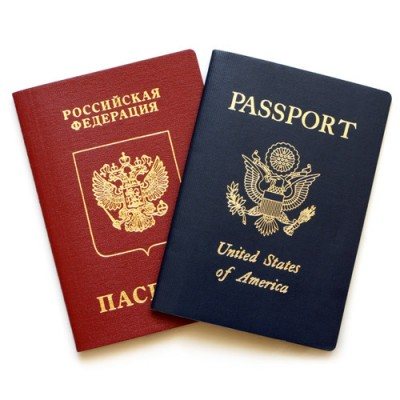
The first case previously provided for the renunciation of current citizenship, and only after this is the adoption of Russian citizenship allowed. Now this condition is optional.
But in the case when a Russian citizen decides to acquire another citizenship, he can, if he wishes, remain a citizen of Russia and have dual citizenship in accordance with all the rules.
The procedure for obtaining dual citizenship is a standard procedure, and a rather lengthy one. In order to ultimately obtain a foreign passport, the first thing you should do is apply for a residence permit or permanent residence permit. The preparation of these documents involves the collection and preparation of a whole list of papers, which then must be submitted to the migration service authorities.
Further, you must live in the country for a certain period of time, which varies from 3 to 12 years. A mandatory condition is the mastery of language, culture, history and legislation. While staying in another country, the citizen undertakes to strictly comply with the laws of the country and signs the relevant papers.
In addition, a foreign citizen is obliged to establish himself as law-abiding and not have any claims from law enforcement agencies.

According to statistics, Russians most often obtain dual citizenship with Western countries that have developed infrastructure and economies. These include:
- America,
- Canada,
- Germany,
- France,
- Israel,
- UK,
- Italy.
However, in addition to this, in a number of countries Russian citizens are quite willing to obtain dual citizenship for the purpose of going on vacation and even purchase real estate there. Although from a statistical point of view, foreign passports in this case are issued much less frequently. These are Türkiye, Egypt and Greece.
Although from a statistical point of view, foreign passports in this case are issued much less frequently.
Institute of dual citizenship and legal aspects
The issue of dual citizenship is controversial in many countries around the world. There are states where they are not ready to issue national passports to foreigners if they have not renounced the documents received at home. For example, citizenship in Germany and Switzerland is granted subject to the renunciation of the status of a citizen of another country. But there are also more loyal countries. A striking example is the United States, where many binationals live.
Although dual citizenship is not prohibited by law in Russia, essentially the second passport will not play any role unless it is issued by Tajikistan. Only this state has signed an international agreement. According to it, the citizenship of both countries is mutually recognized in both Russia and Tajikistan.
If a Russian receives dual citizenship in another country, then he should be concerned not only with the fine for failure to notify, but also with other legal aspects. For example, you should be prepared for the fact that he will be required to fulfill his obligations both in Russia and in another state where he managed to obtain a special legal status. If military service is compulsory, then in fact it will have to be performed both at home and abroad.
This is true for taxes as well. So the issue of dual citizenship is controversial not only because in Russia they require mandatory information about it to the Main Directorate for Migration of the Ministry of Internal Affairs. Whether it makes sense to receive it at all, you need to decide in each individual case whether it is advisable to become a citizen of another state.
So the issue of dual citizenship is controversial not only because in Russia they require mandatory information about it to the Main Directorate for Migration of the Ministry of Internal Affairs.
Ways to check violators
The audit can be carried out by government agencies, usually among government employees. The ban on dual citizenship applies to government bodies at various levels and to law enforcement agencies.
The absence of checks does not exempt persons who have not submitted a notification of dual citizenship from a fine.
The group of persons who are not required to submit a notification includes:
- Russian citizens who have permanent residence in another country;
- citizens of states that have signed a document legalizing dual citizenship (in the case of Russia, Tajikistan can serve as an example).
The Federation Council approved the law on liability for concealing dual citizenship
On Wednesday, May 28, the Federation Council approved a law introducing criminal liability for concealing dual citizenship.
From now on, Russians will have to report whether they have citizenship of another state within 60 days from the date of receipt.
Let us remind you that the initiative was submitted to the State Duma by LDPR deputy Andrei Lugovoi, and on May 23 the document was adopted by the lower house of parliament.
The bill provides for administrative liability for late submission of data on second citizenship, provision of such information in incomplete form, or provision of knowingly false information. For such violations it is expected to levy a fine of 500 to 1 thousand rubles.
As ITAR-TASS notes, for residents of Crimea and Sevastopol the law should come into force on January 1, 2021, and for all other Russian citizens - within 60 days after official publication.
MEANWHILE, will dual citizenship be brought under the article? Those Russians who have acquired several passports at once will apparently soon have to think about it - isn’t it in vain? The State Duma is preparing a law to introduce criminal liability for concealing foreign citizenship, and this Wednesday the bill was adopted in the first reading. According to the idea of the author of this bill, deputy Andrei Lugavoy, the Investigative Committee will have to find out how many states a citizen has sworn allegiance to. But to make his task easier, the “multi-passport” Russian will be charged with a special duty - to inform the authorities of the Federal Migration Service (FMS) about dual citizenship within a month after receiving it. Those who already have foreign citizenship are required to notify the authorities within 3 months after this law comes into force (read further).
Renunciation of Russian citizenship

The procedure for renouncing Russian citizenship is enshrined in Federal Law No. 62 of May 31, 2002. Every citizen has this right, without giving reasons for refusal. This document provides for two schemes for renouncing Russian citizenship:
- standard;
- simplified.
A simplified form is used:
- for persons living in the territory of another state;
- minors whose legal representatives are foreign citizens.
The following circumstances may serve as a basis for refusal to exercise the right to renounce Russian citizenship:
- existing unfulfilled obligations (for example, evasion of military service, debt for utilities, free education, unpaid tax payments, etc.);
- current status of an accused or convicted person;
- the lack of a citizen’s right to legal residence in another state and the failure to provide guarantees that this right will be obtained after renouncing Russian citizenship.
The basis for obtaining citizenship of another country is often a certificate of renunciation of Russian citizenship, certified by a notary.
Note! For renunciation of citizenship, a tax of 3,500 rubles is required.
Upon subsequent restoration of citizenship, the former Russian citizen will undergo this procedure on the general basis provided for acquiring Russian citizenship. The period of residence in Russia for former citizens will be 3 years, and not 5 years established by the general procedure.
Institute of dual citizenship and legal aspects
Modern bilateral relations between countries suggest the existence of such a thing as dual citizenship. Legalization of the status of a citizen of two or more foreign states is carried out at the level of intergovernmental agreements and agreements. An example of such an agreement could be the agreement between Russia and Tajikistan. Such agreements are designed to regulate such important aspects of people’s lives as:
- military duty;
- payment of tax payments;
- provision of social guarantees.
The absence of such agreements creates a “legal vacuum”, creating additional difficulties and disagreements in relations between countries, introducing additional difficulties into the lives of “dual” citizens.
In the absence of an additional agreement expressed by a special agreement between countries, priority in the exercise of rights and obligations, as a rule, is given to the state in whose territory the above-mentioned persons reside.
Dual citizenship is prohibited in such developed countries as Germany, Japan, China, Norway, and South Korea.
Failure to exercise the right to dual citizenship is expressed in the following restrictions:
- renunciation of previous citizenship as a prerequisite for obtaining a new one;
- automatic renunciation of citizenship upon acquisition of it in another country;
- refusal to grant citizenship status by birth if the newborn simultaneously receives the right to citizenship of another country.



